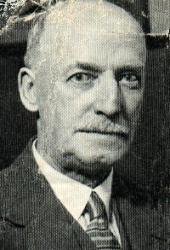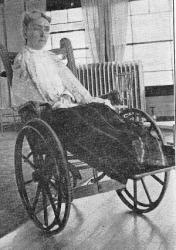Planning worship?
Check out our sister site, ZeteoSearch.org,
for 20+ additional resources related to your search.
- |
User Links
Person Results
William Henry Monk

1823 - 1889 Person Name: William Henry Monk, 1823-1889 Scripture: 2 Corinthians 12:9 Harmonizer of "MELCOMBE" in Singing the Faith William H. Monk (b. Brompton, London, England, 1823; d. London, 1889) is best known for his music editing of Hymns Ancient and Modern (1861, 1868; 1875, and 1889 editions). He also adapted music from plainsong and added accompaniments for Introits for Use Throughout the Year, a book issued with that famous hymnal. Beginning in his teenage years, Monk held a number of musical positions. He became choirmaster at King's College in London in 1847 and was organist and choirmaster at St. Matthias, Stoke Newington, from 1852 to 1889, where he was influenced by the Oxford Movement. At St. Matthias, Monk also began daily choral services with the choir leading the congregation in music chosen according to the church year, including psalms chanted to plainsong. He composed over fifty hymn tunes and edited The Scottish Hymnal (1872 edition) and Wordsworth's Hymns for the Holy Year (1862) as well as the periodical Parish Choir (1840-1851).
Bert Polman
William Henry Monk
Francis Duckworth

1862 - 1941 Person Name: Francis Duckworth, 1862-1941 Scripture: 2 Corinthians 12:8-11 Composer of "RIMINGTON" in Together in Song Born: December 25, 1862, Rimington, Yorkshire, England.
Died: August 16, 1941, at his home Swanside in Colne, England.
Buried: St. Mary the Virgin Anglican Church, Gisburn, Lancashire. His gravestone bears the music of Rimington, and a plaque to his memory was placed above the doorway to the former Methodist Chapel in Stopper Lane, Lancashire.
When Duckworth was five years old, his family moved to the village of Stopper Lane, near Rimington. He had to leave school at age 12 to help in the family business. At age 20, he moved to Burnley, Lancashire, to work for a tobacconist cousin. Six years later, he returned to live at Colne, and in 1899 took a grocery business in Market Street, Colne.
Duckworth had an early interest in music, but received only three months of formal lessons. Shortly after arriving in Colne, he became deputy organist (later organist) at the Albert Road Methodist Church, serving until 1929. He composed numerous hymn tunes, 18 of them appearing in the Rimington Hymnal. His tune Rimington was sung by a massive congregation of British troops on the Mount of Olives after the surrender of Jerusalem during World War I.
--www.hymntime.com/tch
Francis Duckworth
Annie Johnson Flint

1866 - 1932 Scripture: 2 Corinthians 12:9-10 Author of "What God Hath Promised" in Hymns of Faith Born: December 24, 1866, Vineland, New Jersey.
Died: September 8, 1932, Clifton Springs, New York.
Buried: Clifton Springs, New York.
The biographical account of poetess/hymn-writer Annie Johnson Flint (1866-1932) is a story of both heartbreak and triumph. Born on Christmas Eve in the small town of Vineland, New Jersey, she was welcomed by Eldon and Jean Johnson as their greatest earthly gift. Three years later, little Annie would lose her mother, who died as she gave birth to Annie’s baby sister. Mr. Johnson, who himself was suffering from an incurable disease, willed the children to the Flint family who would bring them up in the Baptist faith.
It was during a revival meeting at the age of 8 that the Spirit of God brought Annie’s young heart to faith in Christ. She always believed that at that time, she was truly converted. Though she did not join the church until 10 years later, she never doubted that “the eternal work was then wrought.” She strongly opposed the idea that young children cannot comprehend spiritual truths. She felt that divine mysteries were often plainer to the simple faith of a child than to many adults, blinded by their own prejudices and intellectual doubts.
Whether by nature or through her early Christian experience, Annie was generally disposed to be cheerful and optimistic. She looked on the bright side of life and was able to get much enjoyment out of life. Her forward-looking, lifted-up head was a characteristic attitude and was typical of the courage she was to manifest in later life. She certainly learned to “endure hardness as a good soldier of Jesus Christ.”
After high school, she spent one year in teacher training and had a position offered to her, but felt that she was really needed at home. Later in her second year of teaching, arthritis began to show itself. She grew steadily worse until it became difficult for her to walk at all, and she was soon obliged to give up her work, followed by three years of increasing helplessness. The death of both of her adoptive parents within a few months of each other left Annie and her sister alone again. There was little money in the bank, and the twice-orphaned children had come to a real “Red Sea place” in their lives.
Her verses provided a solace for her in the long hours of suffering. Then she began making hand-lettered cards and gift books, and decorating some of her own verses. Testimonies came from many directions of blessing received, so two card publishers printed some of her greetings and released the first little brochure of her poems. The publication of her booklets and the action of the Sunday School Times linked her up with a worldwide fellowship, and she carried most of the correspondence, though one wonders how she could get a pen through those poor twisted fingers. Her letters were as rich as her poems, always bringing a touch of humor that was refreshing. She loved to give to others, but was reluctant to receive, even though she suffered great times of trial and testing. Eventually she gained new understanding and learned how to share the hard moments of her life with others who could not understand the hardships of their lives. She put into poetry words that she titled, “What God Hath Promised.” And through those words and many others, she became convinced that God intended to glorify Himself through her in her weak, earthen vessel; and like Paul, she gained real assurance and could say with the apostle, the promise granted to him: “My grace is sufficient for thee: for my strength is made perfect in weakness.” She could also say with Paul, “Most gladly therefore will I rather glory in my infirmities that the power of Christ may rest upon me.” She believed that God had laid her aside for a purpose, even though that purpose was obscure to her at times.
The marvelous thing is that Annie’s faith never faltered, and that she was at all times able to say, “Thy will be done.”
--www.homecomingmagazine.com/ (excerpts)
Annie Johnson Flint
Sylvia G. Dunstan
1955 - 1993 Person Name: Sylvia G. Dunstan, 1955-1993 Scripture: 2 Corinthians 12:1-10 Author of "You, Lord, Are Both Lamb and Shepherd" in Common Praise (1998) After a brief, arduous battle with liver cancer, Canadian Sylvia Dunstan died in 1993 at the age of 38. For thirteen years, Dunstan had served the United Church of Canada as a parish minister and prison chaplain. She is remembered by those who knew her for her passion for those in need, her gift of writing, and her love of liturgy.
Sing! A New Creation
Sylvia G. Dunstan
William M. Runyan

1870 - 1957 Scripture: 2 Corinthians 12:9-10 Composer of "[God hath not promised skies always blue]" in Hymns of Faith Showing early musical promise, William Marion Runyan (b. Marion, NY, 1870; d. Pittsburg, KS, 1957) was a substitute church organist by the age of twelve. He became a Methodist minister in 1891 and served several churches in Kansas but turned to evangelism in 1903; he worked for the Central Methodist Conference for the next twenty years. Following that service, Runyan became pastor at the Federated Church at John Brown University, Sulphur Springs, Arkansas. Editor of Christian Workers Magazine, he also served the Moody Bible Institute and was an editor for Hope Publishing Company until his retirement in 1948. Runyan wrote a number of hymn texts, gospel songs, and hymn tunes.
Bert Polman
William M. Runyan
John R. Van Maanen
Person Name: John R. Van Maanen, 1958- Scripture: 2 Corinthians 12:1-10 Composer of "CHRISTUS PARADOX" in Common Praise (1998) John Van Maanen has been a member of Arcady since its founding and often sings as a baritone soloist in performances of Handel's Messiah. He sings in the choir of his home congregation and sometimes serves as a substitute organist in local churches.
John’s first hymn tune, (Christus) Paradox (1984), is in three Canadian denominational hymnals: Voices United (1996), The Book of Praise (1997) and Common Praise (1998). Common Praise (1998) also has his tune, Phos Hilaron, written in 1990.
John’s arrangement of the hymn Let All Mortal Flesh Keep Silence was published by Oxford University Press in 2007. He continues to enjoy composing: most of his works are for choir with organ accompaniment.
John Van Maanen
John R. Van Maanen
W. Elmo Mercer
1932 - 2020 Scripture: 2 Corinthians 12:10 Author of "Each Step I Take" in Hymns of Faith William Elmo Mercer wrote more than 1,600 songs and worked extensively as a music arranger. Arguably his best known song is “Each Step I Take." Mercer worked for the John T. Benson company from 1951 to 1981 as a music editor. He also consulted for LifeWay, Lorenz, Brentwood, and other music companies. He and his wife Marcia traveled as singing evangelists for three decades and he served as the music minister for Scottsboro First Baptist Church in Nashville, Tennessee.
Monty Lynn, from "William Elmo Mercer," Southern Gospel History, https://www.sghistory.com/
W. Elmo Mercer
Cecil Spring-Rice
Person Name: Cecil Spring-Rice, 1859-1919 Scripture: 2 Corinthians 12:9-10 Author of "I vow to thee, my country, all earthly things above" in Common Praise
Cecil Spring-Rice
Gustav Holst

1874 - 1934 Person Name: Gustave Holst, 1874-1934 Scripture: 2 Corinthians 12:9-10 Composer of "THAXTED" in Common Praise Gustav Holst (b. Chelteham, Gloucestershire, England, September 21, 1874, d. London, England, May 25, 1934) was a renowned British composer and musician. Having studied at Cheltenham Grammar School, he soon obtained a professional position as an organist, and later as choirmaster. In 1892, Holst composed a two-act operetta, which so impressed his father that he borrowed the money to send Holst to the Royal College of Music. Severe neuritis in his right hand later caused him to give up the keyboard, and Holst turned to the trombone and composing. In 1895 Holst met Ralph Vaughan Williams, and the two became lifelong friends. Vaughan Williams helped Holst land his first job as a singing teacher. Holst became very interested in Indian and Hindu culture, and composed a number of operas translated from Sanksrit myths. These were not received well in England, however. Holst is best known for his composition, The Planets, as well as
Gustav Holst
Randall J. Harris
b. 1958 Scripture: 2 Corinthians 12:10 Author (stanza 3) of "You Are My All in All (All In All)" in Praise for the Lord (Expanded Edition)
Randall J. Harris


 My Starred Hymns
My Starred Hymns


